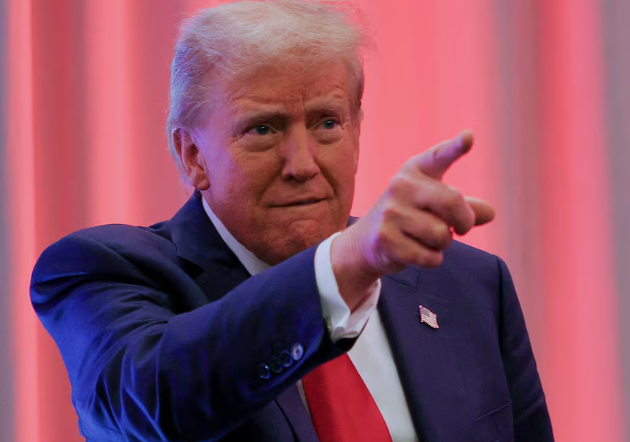In a dramatic legal move, President-elect Donald Trump has urged the U.S. Supreme Court to pause the enforcement of a controversial TikTok ban set to take effect on Jan. 19, just one day before his inauguration.
The request places him in direct opposition to the Biden administration, which has defended the law, arguing that the app presents a “grave” national security threat.
The high-stakes case, one of the most significant before the Court, revolves around whether the ban, passed by Congress with bipartisan support, violates the First Amendment.
Trump’s Push for Negotiation

Trump’s legal filing on Friday did not address the core constitutional question at hand—the conflict between national security and free speech—but instead focused on seeking a delay.
He argued that pausing the ban would allow his administration time to negotiate a solution that balances national security concerns with the First Amendment rights of TikTok users in the U.S., a platform that boasts 170 million active users.
In his brief, Trump suggested that delaying the ban would allow his administration to explore an alternative that could prevent a nationwide shutdown of the popular app, while addressing the national security concerns raised by its Chinese ownership.
This move, he argued, could avert a lengthy and contentious First Amendment battle.
Trump’s position carries weight, as the ban’s effective date coincides with the transition to his successor’s administration, potentially complicating the Biden administration’s ability to enforce the law.
“The First Amendment implications of the federal government’s effective shuttering of a social-media platform used by 170 million Americans are sweeping and troubling,” Trump’s brief stated, adding that such an action could set a dangerous global precedent. He also described himself as “one of the most powerful, prolific, and influential users of social media in history,” underscoring his deep connection to the platform.
Biden Administration Defends National Security Interests
In contrast, the Biden administration has vigorously defended the ban, warning of the severe national security risks posed by TikTok’s operations.
The administration stated that the app, owned by the Chinese company ByteDance, collects vast amounts of data on its American users, raising concerns that this information could be used for Chinese government espionage or manipulation of content.
“TikTok collects vast swaths of data about tens of millions of Americans,” the administration’s brief argued. “China could covertly manipulate the platform to advance its geopolitical interests, such as sowing discord and disinformation during a crisis.”
These assertions echo the concerns raised by former President Trump, who had previously signed an executive order aimed at banning TikTok due to similar national security fears.
Legal and First Amendment Tensions
At the heart of the dispute lies a fundamental tension between national security concerns and free speech rights.
As the Supreme Court prepares for oral arguments on Jan. 10, it must navigate whether the government’s national security justification outweighs the constitutional protections guaranteed by the First Amendment.
The case has drawn a flurry of legal briefs from various stakeholders, including advocacy groups and former government officials.
TikTok, in its own brief, asserted that the government’s actions would shut down one of the largest social media platforms in the U.S., severely limiting Americans’ ability to freely engage with content and connect with others online.
The company argued that the government’s move was an extreme measure that should only be considered after all other alternatives, such as disclosing the company’s ownership structure, have been exhausted.
The American Civil Liberties Union (ACLU) and the Knight First Amendment Institute have also weighed in, arguing that banning TikTok could set a dangerous precedent for restricting access to foreign media and speech in the U.S., a practice they associate with authoritarian regimes.
These groups contend that the government’s concerns about foreign manipulation do not justify infringing on Americans’ right to access content from abroad.
Bipartisan Support for the Ban
Interestingly, Trump’s position on the ban has garnered support from several former officials from his own administration.
Notably, former Vice President Mike Pence and former Attorney General Jeff Sessions have joined with the Biden administration in backing the TikTok ban, calling it essential for safeguarding national security.
Pence’s political advocacy group, Advancing American Freedom, labeled TikTok “digital fentanyl” and a “technological weapon” used by the Chinese government to manipulate U.S. citizens.
The case is complicated further by the bipartisan backing the ban has received from Congress, reflecting widespread concerns about the app’s security risks.
Despite this, legal experts and First Amendment advocates warn that the case could set a precedent for broader government control over speech and content on social media platforms.
What’s Next for TikTok and U.S. Free Speech?
As the Supreme Court prepares to hear arguments in what is sure to be a landmark case, the future of TikTok in the U.S. hangs in the balance.
The justices must determine whether the government’s national security claims are substantial enough to justify a sweeping ban on a platform used by millions of Americans, or whether such a ban would unreasonably infringe upon the free speech rights of citizens.
With the clock ticking toward the Jan. 19 deadline, this case is poised to shape the legal landscape surrounding social media regulation, national security, and the balance between government power and individual rights.
The Court’s decision will not only impact TikTok but could also set a broader precedent for how the U.S. government interacts with foreign-owned tech companies in an increasingly digital world.

